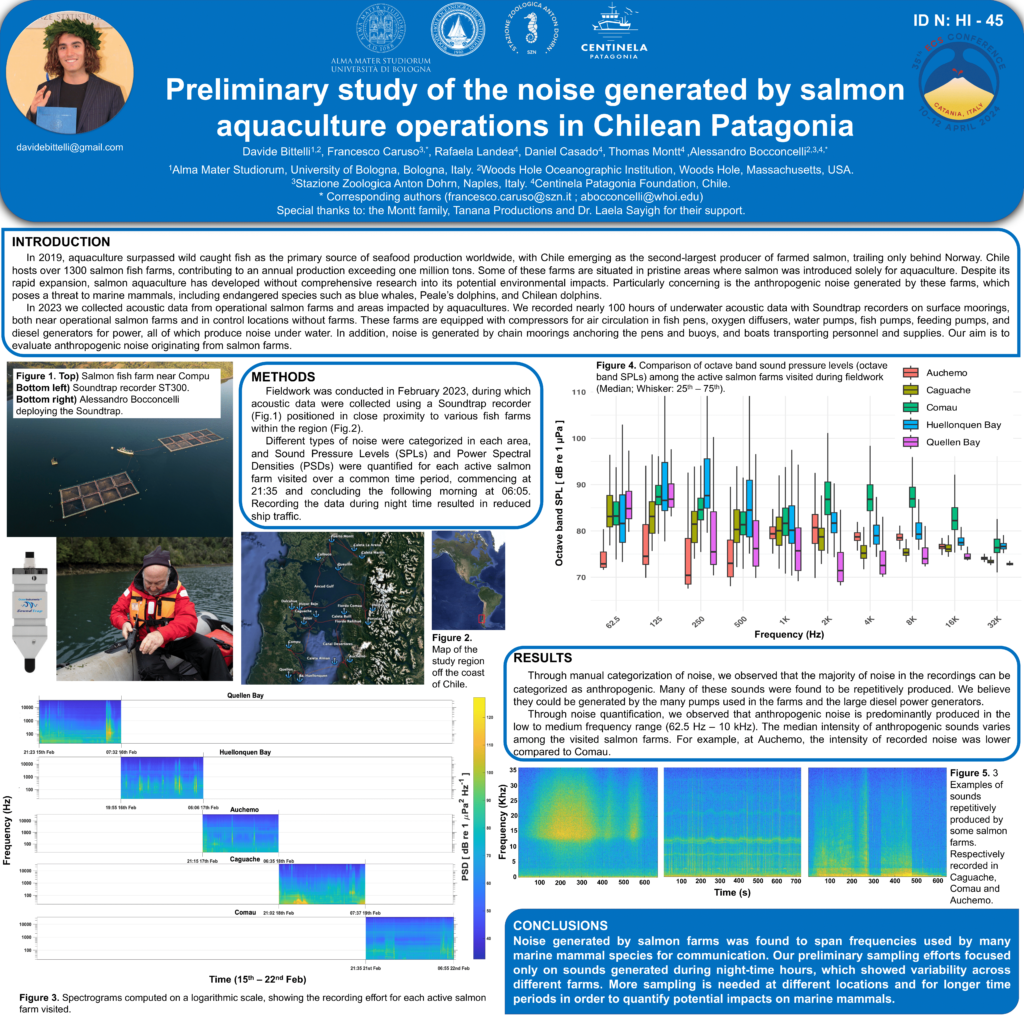In 2024, during the European Cetacean Society (ECS) Conference in Catania, I had the chance to present a poster on a preliminary study concerning anthropogenic noise generated by salmon aquaculture in Chile. The analysis involved examining acoustic data collected near several active fish farms in the region, allowing me to classify the sounds produced by the farms and to quantify the extent of anthropogenic noise pollution.

Introduction
In 2019, aquaculture surpassed wild caught fish as the primary source of seafood production worldwide, with Chile emerging as the second-largest producer of farmed salmon, trailing only behind Norway. Chile hosts over 1300 salmon fish farms, contributing to an annual production exceeding one million tons. Some of these farms are situated in pristine areas where salmon was introduced solely for aquaculture. Despite its rapid expansion, salmon aquaculture has developed without comprehensive research into its potential environmental impacts. Particularly concerning is the anthropogenic noise generated by these farms, which poses a threat to marine mammals, including endangered species such as blue whales, Peale’s dolphins, and Chilean dolphins.
In 2023 we collected acoustic data from operational salmon farms and areas impacted by aquacultures. We recorded nearly 100 hours of underwater acoustic data with Soundtrap recorders on surface moorings, both near operational salmon farms and in control locations without farms. These farms are equipped with compressors for air circulation in fish pens, oxygen diffusers, water pumps, fish pumps, feeding pumps, and diesel generators for power, all of which produce noise under water. In addition, noise is generated by chain moorings anchoring the pens and buoys, and boats transporting personnel and supplies. Our aim is to evaluate anthropogenic noise originating from salmon farms.
Methods
Fieldwork was conducted in February 2023, during which acoustic data were collected using a Soundtrap recorder (Fig.1) positioned in close proximity to various fish farms within the region (Fig.2). Different types of noise were categorized in each area, and Sound Pressure Levels (SPLs) and Power Spectral Densities (PSDs) were quantified for each active salmon farm visited over a common time period, commencing at 21:35 and concluding the following morning at 06:05. Recording the data during night time resulted in reduced ship traffic.
Results
Through manual categorization of noise, we observed that the majority of noise in the recordings can be categorized as anthropogenic. Many of these sounds were found to be repetitively produced. We believe they could be generated by the many pumps used in the farms and the large diesel power generators. Through noise quantification, we observed that anthropogenic noise is predominantly produced in the low to medium frequency range (62.5 Hz – 10 kHz). The median intensity of anthropogenic sounds varies among the visited salmon farms. For example, at Auchemo, the intensity of recorded noise was lower compared to Comau.
Conclusions
Noise generated by salmon farms was found to span frequencies used by many marine mammal species for communication. Our preliminary sampling efforts focused only on sounds generated during night-time hours, which showed variability across different farms. More sampling is needed at different locations and for longer time periods in order to quantify potential impacts on marine mammals.
Acknowledgments
Davide Bittelli1,2, Francesco Caruso3,*, Rafaela Landea4, Daniel Casado4, Thomas Montt4 ,Alessandro Bocconcelli2,3,4,*
1Alma Mater Studiorum, University of Bologna, Bologna, Italy. 2Woods Hole Oceanographic Institution, Woods Hole, Massachusetts, USA. 3Stazione Zoologica Anton Dohrn, Naples, Italy. 4Centinela Patagonia Foundation, Chile.
* Corresponding authors (francesco.caruso@szn.it ; abocconcelli@whoi.edu)
Special thanks to: the Montt family, Tanana Productions and Dr. Laela Sayigh for their support.